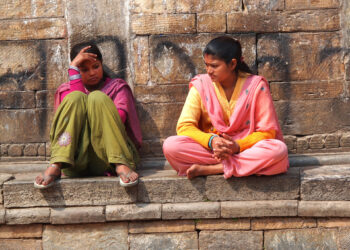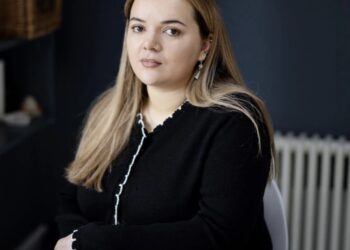Although Pregnancy Osteoporosis and fracturing your spine after having a baby is rare, it’s a stark reminder to look after your bones. One in two women will experience at least one fracture due to osteoporosis after the menopause.
With World Menopause Day and World Osteoporosis Day both happening this week, it’s a good time to remember the importance of bone health.
In 2022, eight months after giving birth to my daughter Maeve at 36, I was diagnosed with a rare but serious condition called Pregnancy Associated Osteoporosis (PAO) due to fracturing my spine. It turned out I had the bone density of an elderly woman.
Women do lose bone density during the third trimester of pregnancy and when breastfeeding but it usually recovers on its own. However, women with PAO develop such low bone density that they fracture their spine (or in some cases, their hips) during, or in the few months, following pregnancy.
It’s not known what causes PAO and it’s likely to be a mix of factors for different women. But Caucasian petite women with hypermobility or chronic inflammatory conditions, like Coeliac or Crohn’s disease, are more prone to it. (Though I don’t have any of the latter.)
I now take daily Osteocare tablets plus extra vitamin D. I’m also more aware of the need to eat a well-balanced diet with plenty of protein and calcium, and to do core strength training and weight bearing exercise.
However, it can be hard to prioritise myself alongside work and being a mum. I’ll be turning 40 in March and know I must make my bones as resilient as possible before I hit the perimenopause and menopause.
Shortly after my PAO diagnosis, I connected with other mums with the condition via the PAO UK Facebook group and have listened to many of their stories.
Most of us went unheard by midwives and doctors for months, even years. We struggled to be diagnosed, often paying privately for an MRI to prove we had broken our backs or hips. All while struggling to care for our babies.

Finally, for most of us, finding out we had broken our backs was, bizarrely, a relief. We felt validated. The physical, and subsequent mental, health challenges we’d experienced weren’t all in our heads.
Valerie Farr, 46, from South London, is concerned about how the menopause could impact her spine. She suffered several spinal fractures after the birth of her children in both 2016 and 2019. Yet despite being diagnosed with PAO before her second pregnancy, wasn’t advised to have a caesarean or warned about the risks of breastfeeding.

“No one should be at risk of spinal fractures at two very distinct periods in their life: the impact on physical and mental health is just too great,” she said.
“PAO has already robbed me of the chance to joyfully embrace becoming a mum, and affected all areas of my life, from work to friends and travel. I don’t want to be robbed of any other opportunities as my children get older.”
Karen Whitehead MBE, from Somerset, was diagnosed with PAO thirty-two years ago. She has suffered over fourteen fractures and subsequent health complications as a result, losing five inches in height and ending up in a wheelchair.
She told me she was at such a low about twelve years ago that she visited the Dignitas website for information on assisted dying. “I thought I’m coming up to 50 – the age of the menopause, when one in two women will get osteoporosis, lose up to 20% bone density and start fracturing, and I couldn’t face that.” Thankfully however, fate stepped in.
Karen’s GP wrote a letter to a specialist bone health team at Addenbrooke’s Hospital in Cambridge who took her on. Because no osteoporosis treatments are available to premenopausal women in England (though are for men of any age), the team managed to secure exceptional local healthcare funding to treat her.
Aged 62 and having been through the menopause, Karen now has the best bone density she has had in years. She’s on her feet again and able to live an active life. Karen is a beacon of hope for us all.

Karen is also the biggest advocate for PAO mums, volunteering tirelessly to call for the healthcare changes and access to treatment urgently needed. She doesn’t want more mums to go through what she has.
She is leading the effort to register PAO UK as a charity, which I will be a trustee for. While earlier this year, following the first UK research on PAO in decades, she launched the campaign: #Measurethatmum to raise awareness.
Professor Stuart Ralston, the rheumatologist leading the University of Edinburgh research, told me he supports the campaign. “Height loss plus severe back pain is a red flag for PAO and should be further investigated,” he said.
Kassim Javaid, professor of osteoporosis and adult rare bone diseases at the University of Oxford, told me for a news feature in leading medical journal The BMJ that, “We live in a discriminatory healthcare system, so women’s needs are often ignored. Healthcare teams consistently think PAO is just pregnancy pain. Whatever that is.”
He said: “The killer statement I hear too often is, ‘It hurt so much I couldn’t even lift my baby.’ If the back or hip pain is so bad that a mother can’t lift her baby, you need to do something about it.
“The sad thing is that nothing has changed in over 30 years. We’ve failed in the NHS to address this.”
This NHS failure is why Valerie, Karen and I, and so many of the women who are part of PAO UK, are pushing for change. We want to promote better bone health, better physical and mental healthcare for mums with PAO, and better maternity and women’s healthcare for all.











